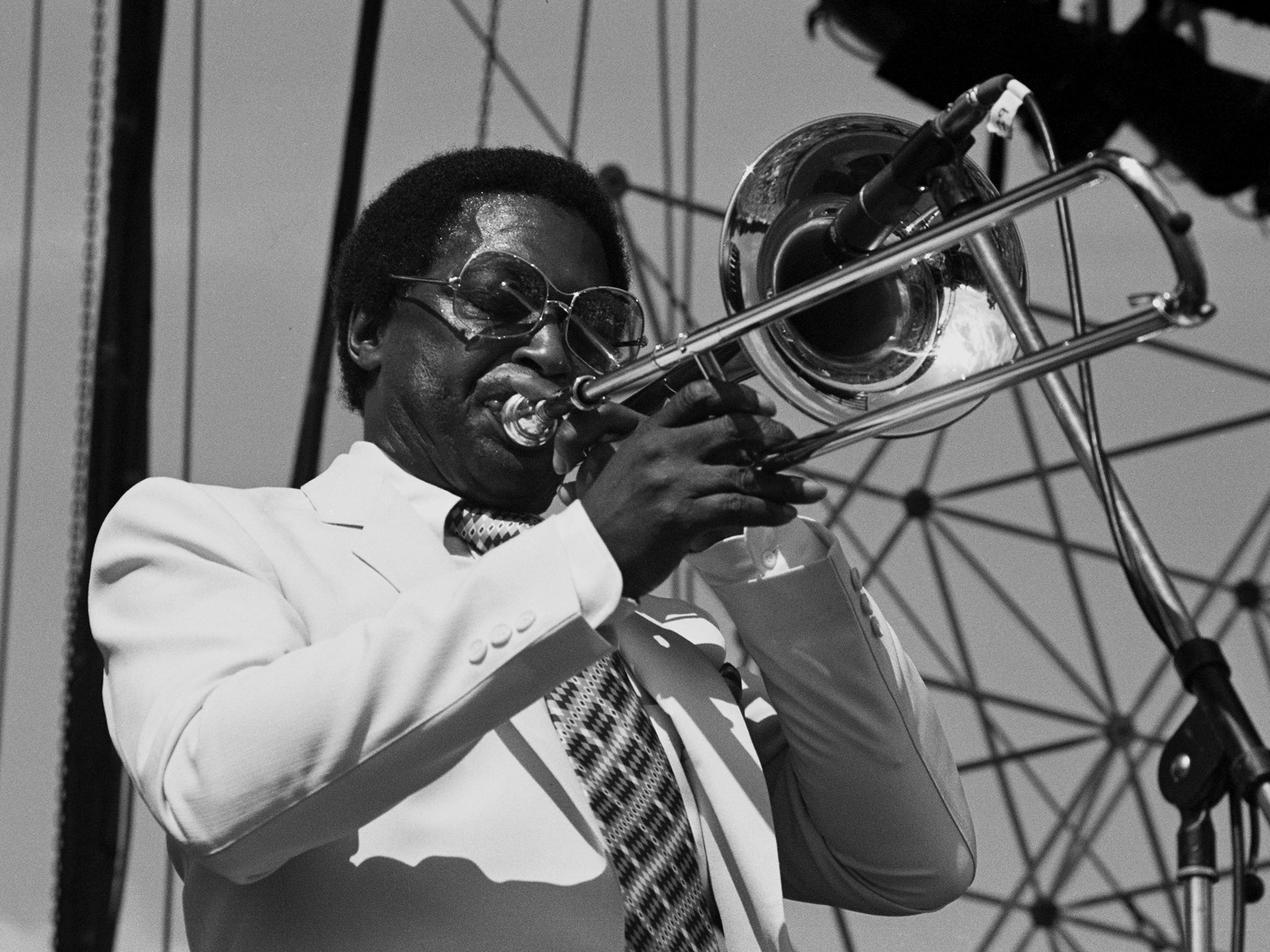Curtis Fuller: Leading jazz trombonist who played with hard-bop greats
The Detroit-born musician collaborated with Miles Davis and John Coltrane among many others

Curtis Fuller, an acclaimed jazz trombonist who was a key contributor to the bluesy, hard-bop style of the Fifties and Sixties and who was named “a jazz master” by the National Endowment for the Arts, has died aged 88.
Fuller was among the dozens of musicians to emerge from the mid-century jazz scene of Detroit, where he learned to play intricate, fast-paced bebop figures on the unwieldy slide trombone.
When Fuller arrived in New York in the mid-Fifties, he immediately became a major figure in the hard-bop movement, then being developed by such musicians as saxophonists John Coltrane and Benny Golson, trumpeters Lee Morgan, Kenny Dorham and Art Farmer, and drummers Art Blakey and Louis Hayes – all of whom Fuller would record with.
“Curtis is one of the greatest trombonists to ever play the instrument,” Hayes told the Arizona Star in 2007.
In 1957, Fuller was briefly in Miles Davis’s band and made his first albums as a leader. He appeared on many others as a sideman, including one of Coltrane’s most lauded recordings from the period, Blue Train.
On the title track, Fuller played a powerful five-note introductory figure in unison with Coltrane, later joined by Morgan on trumpet. It is one of the most memorable jazz tunes of the era and features a bold, fluid solo by Fuller.
He inadvertently named another tune on the album, he recalled in a 2007 interview with the National Endowment for the Arts (NEA), when he complained to Coltrane: “John, you put this music on us on a moment’s notice. We got three hours to rehearse this music and we’re going to record?” Coltrane called the tune “Moment’s Notice”.
In 1959, Fuller became a founding member of the Jazztet, a group led by Farmer and Golson and including pianist McCoy Tyner. Along with Blakey’s Jazz Messengers and Horace Silver’s groups, the Jazztet was one of the premier hard-bop units of the time.
In 1961, Fuller joined one of the most formidable incarnations of the Jazz Messengers, with saxophonist Wayne Shorter, trumpeter Freddie Hubbard and pianist Cedar Walton.
During his four years with Blakey’s group, Fuller toured widely, appeared on 10 recordings and wrote several tunes that became enduring classics of the hard-bop repertoire, including “Bu’s Delight” and “A La Mode”. Fuller continued to lead his own ensembles and to record with other musicians, including saxophonist Jimmy Heath.
After Coltrane’s death in 1967 and the death of a sister about the same time, Fuller gave up music and took a desk job with Chrysler Corp in New York. Trumpeter Dizzy Gillespie brought him out of early retirement by hiring him for his band in 1968. Fuller was in Count Basie’s big band from 1975 to 1978, then began a career resurgence, recording with trombonist Kai Winding, trumpeter Woody Shaw and Golson.
“His sound was warm, captivating … and his time feel was so deep in the groove,” one of his proteges, trombonist Steve Davis, said. “His technical prowess was off the charts, yet his solos were always soulful and melodic, first and foremost. Curtis always said, ‘I’m not trying to win any Trombone Olympics’. We all knew he could, but … it was never his concern to ‘outplay’ anyone.”
Curtis DuBois Fuller was born on 15 December 1932 in Detroit. His father died before he was born, and his mother died by the time he was 10. Young Curtis then entered an orphanage, where he stayed through high school. He was in his teens when a nun at the orphanage took him to a concert by Illinois Jacquet’s jazz orchestra, which included trombonist JJ Johnson.
“I saw symphony orchestras, [but] I didn’t see anybody like myself,” Fuller said in 2007. “That’s why when I saw JJ … I said, ‘I think I can do this.’” Fuller, who had been playing the baritone horn, a valved instrument, immediately switched to trombone.
In the army in the 1950s, he was part of a band at Fort Knox, led by saxophonist Julian “Cannonball” Adderley, with Junior Mance on piano.
Back in Detroit after his discharge, Fuller attended what is now Wayne State University – where his roommate was saxophone great Joe Henderson – and worked in clubs with many of the city’s leading jazz musicians.
He often toured with Golson, his old partner with the Jazztet, until retiring from performing about 10 years ago. He appeared on an estimated 400 recordings throughout his career.
Fuller lived for many years in Worcester, Massachusetts, and taught in the jazz programme at the University of Hartford and other colleges. He was also affiliated with the Jazz Ahead education programme at the Kennedy Centre in Washington.
In 2007, Fuller was named an NEA Jazz Master, one of the country’s highest honours for jazz musicians.
“When I came to New York,” he said in a 2007 interview with the NEA, “I always tried to impress people, play long solos as fast as I could, lightning fast, and all of a sudden Billie Holiday said, ‘When you play, you’re talking to people. So learn how to edit your thing, you know?’ I learned to do that.
“Go back and check out where you came from. You have to know where you come from in order to know where you’re going or know where you’ve been.”
He is survived by eight children, nine grandchildren, and 13 great-grandchildren.
Curtis Fuller, trombonist and musician, born 15 December 1932, died 8 May 2021
© The Washington Post



Bookmark popover
Removed from bookmarks